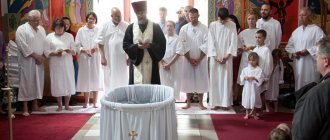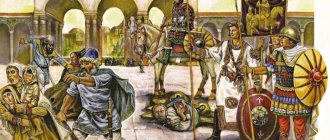Christmas: why and why did God become Man?
I remember once, on the eve of Christmas, a TV journalist I knew half-jokingly complained: “Well, I can’t talk about news that is 2000 years old!” Jokes aside, but really: what's the news?
The main Christmas news, of course, is that God became Man. But what is the reason for the appearance of God in our world? And what is the goal? Two main questions.
To answer them, one cannot do without the story of the Fall. Yes, yes - this is about Adam and Eve, the violation of the commandment, the expulsion from the Garden of Eden... The famous biblical story is not the life story of the first family: there lived a man Adam, and he had a wife. Then they ate something wrong, God got angry with them and kicked them out of Paradise... In this seemingly simple story, the book of Genesis tells us about the universal catastrophe that occurred in the relationship of God with man. A catastrophe that affected not only human life, but also the existence of the entire created world. The Fall fundamentally changed man. The crown of creation, created by God to remain in communion with Him, man rejected the life offered to him in the Garden of Eden, exchanging it for the illusory promise to “be like the gods.”
No miracle happened. On the contrary, disobedience distorted God's originally created human nature, created in the image and likeness of the Creator. And now Adam and his wife are hiding from the Creator... behind the trees! Thus, mischievous children crawl under the bed, naively believing that their parents will not guess where they are. But God, as a merciful Father, gives Adam another chance, asking him first where he is, and then whether he has eaten from the fruit of a tree from which he should not have eaten? Of course, God does not ask this question because he does not know what really happened.
Like a caring parent, the Lord hopes for the repentance of his creation. But what does he hear in response? Alas, this is the same thing that teenagers often turn to their parents: reproaches and accusations. “The wife you gave me, she ate and seduced me,” Adam replies. Isn't that familiar? Instead of repentance, there is an attempt to blame the wife for what happened first (alas, familiar male, or rather, not very male behavior) and even God Himself... After the breakup, Adam can no longer remain in Eden. He is driven out of there by lack of repentance. Sin multiplies sin.
Expulsion from Paradise became both the punishment of the first people and, in a sense, their salvation - damaged human nature was burned by the Love of the Creator. We experience something similar when we have done something nasty to a loved one, and he not only is not angry with us, but continues to love and care. At such moments you want to fall through the ground. How Adam and Eve fell into a new life.
But the longing for the lost paradise does not leave the first people, and is also passed on to their descendants, becoming an unquenchable thirst for the entire human race. Man desperately strives to restore this lost connection with God, but, alas, he cannot do this himself. After all, in reality, each of us is far from Baron Munchausen - we just can’t pull ourselves out of the swamp by our hair. A person suffers, like a blind kitten trying to find the way to God, but instead of Him, in the end, he depicts himself either an idol, or a golden calf, or someone else and worships him.
Christian writers come across the image of a source, once polluted, which is no longer able to provide clean water. Imagine: people live around this source for generations, drink this dirty water, constantly get sick, and die. Everyone understands: something is wrong with the water, but there is no other source! They throw either clay or some herbs into this water, cast spells, but the problem remains: after all, none of the residents have any idea what clean water is! Only the “tradition of deep antiquity” preserves the belief that the water was once clean. And then one day in the same village, suddenly a new spring with crystal clear water breaks out from under the ground. It is the Creator Himself who comes to His creation, comes to earth to heal fallen nature, to raise man from his knees, so that he can again freely stand before God and freely, of his own free will, choose good. This is the answer to our first question: why does God come into the world. Because man himself is unable to regain what he once lost.
From this it is clear why God is born into earthly life. One remarkable saint, Athanasius of Alexandria, answered this question in the 4th century: “God became man so that man could become God.” No more, no less. This is what salvation means from a Christian point of view; this phrase contains the whole essence of Christianity. In order for a person to enter heaven, heaven must first descend to earth. This is a manifestation of that love that the Bible speaks of, calling God Himself Love: God is love, and he who abides in love abides in God and God in him (1 John 4:16).
This is the main meaning of Christmas. This is what we celebrate and remember this Christmas season. Merry Christmas!
The author is the head of the Synodal Department of the Moscow Patriarchate for the relationship of the Church with society and the media, professor at MGIMO
Chapter two
As St. Gregory of Nyssa says, “Action is the natural force and movement of every essence, which only non-existence lacks. That which participates in any essence, of course, also participates in the action that makes it manifest. For true reasoning can determine the boundaries of entities, knowing their non-false actions.” For example, thinking is the action of thinking [creatures], feeling is the action of sentient beings, flight is of birds, swimming is of waterfowl, growth is of growing things, crawling is of reptiles, glowing is of luminous things, burning is of igniting things, flowing is of liquid things, sight is of seeing things, and birth is of giving birth. Generally speaking, the natural action of any nature is what designates and determines it; when it ceases, then nature is destroyed and perishes along with it. After all, with the cessation of heat, the fire goes out; when a living being is deprived of movement, it dies; and when [a person] ceases to think, then the thinking and reasoning [beginning of his] soul perishes. That is why we speak of two wills and actions in Christ, so that we do not express [a false position] about His inanimate body and unreasonable soul. For the action of the animate body is walking and labor, the action of the rational soul is its volition, reasoning and desiring thought.
Natural actions are found not only in animate and moving [creatures], but also in inanimate and motionless [creatures]. This is evidenced by scammonia and [other] cleansing [plants] that have a laxative effect; hydrargyra, which produces a deadly effect, and hemlock, also destructive. It is surprising that some very different natures, being deprived of their natural actions, often give rise to other actions. For example, a hot stone loses its cooling effect, but acquires (since it cannot be extinguished) the ability to burn the body. In the same way, cedar, when it is burned in fire, is deprived of its vegetative, growing and generative effects, but it is granted healing and worm-destroying effects.
For those who are knowledgeable and judicious in considering and judging the names of existing things, it is not difficult to discover that most of the names of any existing thing are related to action, and not to nature, for they have names derived from their own actions. To prove this, we should start with the title itself and the name “God”. This word represents to us not the incomprehensible and nameless essence of the Creator itself, but God [so called] due to His contemplative action. Likewise, [the word] “Angel” does not reveal the very essence and being of the nature of Angels, but comes from the announcing action and their angelic service. In the same way, a person is called “man” not because of his essential quality, but because he directs his gaze upward and is called “upward gazer,” the only one of all living creatures [usually] looking at the ground who raises his eyes to grief. Therefore, that is, because of his “upward looking” action, he is called “man.” Others say that he is called “man” because of all living beings, who [usually] walk bent and with their heads down, he alone has the effect of walking upright.
If both names of the essences of Christ (I mean; "God" and "man") are derived from their natural operations, then why are some not ashamed to deny the two operations in Him? They, even if they do not cite any evidence from the [Holy] Scriptures and the Fathers, are put to shame by the very names of Christ, that is, by designating Him as “God and man.” For, as we have just said, almost every nature is named from its essential action. For example, “virgin,” [which means] “putting to death the fire,” comes from “putting to death the kindling of the flesh.” And again, when we say “dove,” we do not denote the nature of this living creature or the quality of its flesh, but the action it performs - after all, the name “dove” comes from “to be stable in flight.” And other names refer to action, and not to nature. In particular, [the word] “deer” [comes] from “to slay snakes”, “swallow” - from “to shake its beak while chirping”, “snake” - from “who once spoke or addressed Eve”, “antelope” - from “to look or see keenly”; the turtle dove, or “preserver of the fruit,” [is so called] because she “preserves her kind” and never enters into a second marriage; [the word] “nightingale” [comes] from “always sing”, that is, to sing in summer and winter, “kite” - from “circling in the heights”, “horse” - from “to strike a spouse”, “ellebor” - from “to strike or kill food” (since “food” is also called “food” in another way), “eagle” or “eternal year” - from “renew itself often” and “live a lot”, “bird” - from “stretch the wing”; the river [is called so] because it gives water, the stream because it “flows in winter”; [the word] “nature” [comes] from “to give birth to hypostases,” “grass” from “to go upward,” and “flower” from “to move or rush upward.”
And the soul is called “soul” from its own action, for “to breathe” means “to give life”; therefore, from the life-giving action of the soul its name comes, since it gives life to the body.
And one can find countless other [beings], if not all, that receive names for their actions, for action is a force of nature.
Not the same action, the actor and the result of the action. After all, “acting” is called existence itself or the reality of essence. The result of an action is the final result of the action of the actor; for example, the results of God's action are heaven, man, Angel and [in general] every creature. Action is called “action” because it exists and is manifested in actions. It is thought of in two ways: as a thinking [action] and as a sensual [action]. Sensual is that [action] that is felt, heard and subject to decay; the intelligible is incorruptible and eternal [action]; and the thinking is that [action] which contemplates invisible speculations. Action is also called “action” from [the verbs] “act” and “commit.”
The will, the willing and the desired are not the same thing. For will is the thinking aspiration of a thinking entity; willing – that very thing that has will; and what is desired is the object of love.
| FIRST PAGE || CONTENTS || CONTENTS || QUESTIONS |
| A B C D E F G H I J K L M N O P R S T U V |
I believe in God the Father
|
- Why do we call God Father?
- What is the similarity between the earthly father and the heavenly Father?
- How should a person who believes that He is our Father relate to God?
God is our heavenly Father
With the Church we believe in one God, the Almighty Father. We will now consider why almighty God is the Father.
Why do we call God Father?
The word “father” in relation to God is understood in different ways. It denotes either His relationship to creation, or the relationship of the first Person of the Most Holy Trinity to the Son.
— God is the Father of creations
God is our Father because He created us and everything visible and invisible. In this sense of the word, God was called Father in Israel and even in some pagan religions, which do not know the mystery of the Holy Trinity. “Referring to God as “Father” is known in many religions. The deity is often seen as the "father of gods and men." In Israel, God is called Father because He is the Creator of the world. God is Father even more by virtue of the union and the giving of the law to Israel, His “firstborn” son (Exodus 4:22). He is also called the Father of the King of Israel."
(Catechism of the Catholic Church, 238)
— God the Father is the First Person of the Holy Trinity
But the Father is called, first of all, the First Person of the Most Holy Trinity, Who eternally gives birth to the Son.
— Father of the Baptized
God is the Father especially for those who have been baptized, since in this sacrament a person receives the grace of adoption and becomes a child of God, participating in the life of the Most Holy Trinity.
What is the similarity between the earthly father and the heavenly Father?
- Father - Creator
On earth, a father is a person who has passed on life to his children, who takes care of them, who will raise them. God is our Father, since He created the world for us, created the immortal soul of each of us, since He cares for us and for all creation. With His commandments, He, the good Heavenly Father, educates us and leads us to the fullness of future eternal happiness. In particular, “God is the “Father of the poor,” the Father of the orphans and widows, who are under His loving care.”
(Catechism of the Catholic Church, 238)
Childhood attitude towards the Heavenly Father
How should a person who believes that He is our Father relate to God?
— Show love by keeping God's commandments
Faith in God, our Father, must first of all motivate us to sincere love for Him. This love is not just a feeling, but it is manifested in the fulfillment of His commandments. “For this is the love of God, that we keep His commandments; and His commandments are not burdensome.” (1 John 5:3). If any child loves his father and mother, he obeys them. We must do the same towards our Father in heaven.
— Trust the Father in all circumstances
A good earthly father always helps his children. The Heavenly Father provides us with even more help, since He loves us very much. If we forget this, we need to look around us, as Jesus advises: “Look at the birds of the air: they neither sow, nor reap, nor gather into barns; and your Father in heaven feeds them. Aren't you much better than them? (...) Look at the lilies of the field, how they grow: they neither toil nor spin; but I tell you that Solomon in all his glory was not dressed like any of them; But if God clothes the grass of the field, which exists today and tomorrow is thrown into the oven, God will clothe it so much more than you, O you of little faith!” (Mt 6:25-30)
— Trust in the Heavenly Father and seek His help
If any child is hungry, he turns to his mother or his father, saying simply: “I am hungry.” The child asks. Since God is our Father, we can always ask Him for help in all life circumstances. Jesus Himself showed how children should simply turn to their good Father and ask Him: “Our Father who art in heaven. (...) Give us our daily bread today, and forgive us our debts, as we forgive our debtors, and do not lead us into temptation, but deliver us from evil.”
- Love people as your brothers, children of one Father
We need to address people as brothers. If we believe that God is truly our Father, we must see each person as our brother and sister, a member of the one great family of God. (cf. Mt 23:8)
Every person is created by God in His image and likeness.
(cf. Gen 1.27)
| FIRST PAGE || CONTENTS || CONTENTS || QUESTIONS |
What God do Orthodox Christians believe in?
For an Orthodox person, the Bible gives clear ideas about who exactly Christians believe in. The Old and New Testaments imply the narrative of the old and new covenants between man and God. In the New Testament, the truth is revealed to the believer about who is God in the full sense.
For Orthodox people, God is the Holy Trinity - Father, Son and Holy Spirit. In Orthodox theology, the Trinity is called consubstantial and indivisible. What does this mean?
Orthodox Christians have faith in one Trinity God in Persons. Thus, the Father is the first Person of the Holy Trinity, the Son is the second Person of the Trinity and the Holy Spirit is the third Person of the Holy Trinity. Otherwise, Persons are called hypostases, which is why you can find the name of the Christian God contained in the term Trinitarian. According to the teachings of the Christian Orthodox Church, all three Persons have divine dignity and equality in divine greatness among themselves.
God the Father revealed himself to the world in the Old Testament. God the Son became incarnate on earth, taking on a human body. In modern times, no one doubts the historical personality of Jesus Christ. For Orthodox people, Christ is in the full sense God, who granted salvation to humanity. It is about the coming of Christ the Savior into the world that the gospels tell. The Holy Spirit revealed himself to the world on the fiftieth day after the resurrection of Jesus Christ. Then the Holy Spirit descended on the apostles of Christ, conveying to them divine grace. It was from the moment of the Descent of the Holy Spirit on the Apostles that the public preaching of Christianity began. That is why the Feast of Pentecost is called the birthday of the Church.
The mystery of the dogma of the Holy Trinity is hidden from full understanding by man due to the limitations of human thinking. Man cannot fully comprehend the essence of God. The Orthodox remain to believe that God is one, but threefold in Persons. That is, there are not three different gods, but one Trinitarian Lord.
It should be noted that for an Orthodox person, the Holy Trinity is not just God who does not participate in people’s lives. Thus, Christians perceive God as a loving Father. Saint John the Theologian in his gospel says directly that God is love. It is precisely this perception of the deity that formed the basis of the worldview of an Orthodox person. God is not just a universal world judge, He is not just the Creator of the visible and invisible world. For Orthodox people, the Lord is a loving Father who is ready to help in all righteous needs those who turn to Him with faith.










